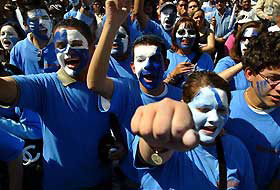 |
 |
 |
 News Around the Republic of Mexico | April 2006 News Around the Republic of Mexico | April 2006  
Mexican Presidential Hopefuls Woo Young Voters Who Could Decide Election
 Ioan Grillo - Associated Press Ioan Grillo - Associated Press


| | Supporters of Mexican presidential candidate Felipe Calderon, cheer during a campaign rally at Guadalajara City's Liberacion Plaza. The three main candidates in Mexico's presidential election all agree on one point: Young voters will play a crucial role in determining the nation's new leader. (P/Guillermo Arias) |
Mexico City – One presidential hopeful compares himself to Mexico's under-17 soccer team. Another's campaign features students, rock bands and dancers. A third hosts rallies in trendy nightclubs.

The three leading candidates in Mexico's July 2 presidential election all agree on one point: In a nation where two-thirds of the 103 million people are under 30, the youth vote is critical.

It tipped the balance in the last presidential election in 2000, when nearly 60 percent of 18-30 year olds who voted picked Vicente Fox, whose victory ended seven decades of one-party rule.

In July, these voters will decide if they want to maintain the pro-business line of Fox's National Action Party, turn to the leftist vision of Mexico City Mayor Andres Manuel Lopez Obrador, or return to the centrist Institutional Revolutionary Party, or PRI, which ran the country for most of the past century.

“In 2000, the young voted for change. Now they might vote for change again,” said Jorge Buendia, of the international polling firm Ipsos Bimsa.

While all the candidates are courting younger voters, National Action's Felipe Calderon is trying hardest.

The youngest of the main candidates at 43, the Harvard-educated lawyer appears regularly on youth-oriented radio stations, and even has his own Internet video game in which he's a superhero, zapping dinosaurs representing the other candidates. And Calderon likens himself to the soccer team which last year stunned the nation by winning the world championship for players 17 or younger.

“I'm like the under-17 soccer team that won the World Cup, not like the adult team that keeps losing on penalties,” he repeats at every opportunity.

Calderon finds his most fertile terrain with the young university-educated professionals such as Rafael Ramirez, 28, a freelance architect in Mexico City.

“We need growth and money, not revolutionary ideology,” Ramirez said. “Calderon is very Harvard and that's good. We want a Mexico of the 21st century.”

But only one-fifth of Mexicans attend college. Many young people have manual jobs on minimum wage of $5 a day. A lot of college graduates can't find work at all.

So many are drawn to the fiery rhetoric of Lopez Obrador and his promises of social justice.

“Lopez Obrador is the anti-establishment candidate and this appeals to the young and angry,” Buendia said.

Supporting the former Mexico City mayor is a group of young leftists who travel across the country staging events in town plazas with rock bands, dancers and mural painters.

“Young people face a lot of problems. Most of us live in bad neighborhoods and have few opportunities. We need radical change,” said the network's Alberto Martinez, a former student activist who participated in a strike over rising fees that shuttered Mexico's National Autonomous University for almost a year.

Among Lopez Obrador's campaign pledges is the promise to create 30 new free public universities.

Most opinion polls show him at least 7 percentage points ahead of both Calderon and PRI candidate Roberto Madrazo.

Madrazo is doing particularly badly with the youth vote, pollsters say, despite hosting some events at hot nightclubs.

Many young people associate the PRI, which ruled for 71 years until 2000, with the corrupt and authoritarian Mexico of their parents and grandparents.

“Young people, especially those with the highest level of schooling, tend to be firmly anti-PRI,” said political analyst Federico Estevez.

Yet while they represent the largest voting bloc, they are also the most apathetic. In midterm elections in 2003, only 30 percent of people aged 18-30 cast a ballot, compared with nearly 50 percent of over-50s.

To fight the apathy, a group has launched its own version of Rock the Vote, the U.S. campaign that included artists such as the Dixie Chicks urging young people to vote in the last U.S. election.

In “Tu Rock es Votar,” or “Your Rock is to Vote,” Mexican pop stars give free concerts to persuade 7 million more young people to register to vote.

“We are urging people to defend the democracy that cost us so much to get,” said Francisco Huidobro, guitarist of the rock band Fobia. “At last we can choose a president and Congress, and it is our responsibility to make sure this continues.” | 
 | |
 |



